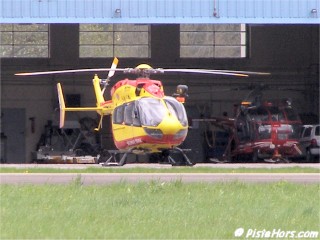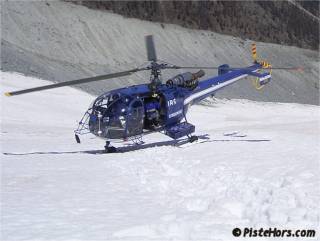Rescue workers boycott EC145 Helicopter
Following two fatal helicopter accidents in the Pyrenees rescue workers belonging to specialist units of the fire service, the police and doctors have vowed to boycott the Eurocopter EC145, the workhorse of French mountain rescue. The most recent incident was a crash on the 5th of June in the Hautes-Pyrénées during a training exercise. One senior helicopter pilot and instructor has said that “although the EC145 is a superb allround helicopter it is not suitable for use in the high-mountains”.

New and Old, EC145 and the Alouette III
The French government has announced restrictions on the use of the EC145 until the exact cause of the problem is understood. However the helicopter appears to suffer from a condition known in the industry as Loss of Tail Rotor Effectiveness (LTE). The tail rotor is used to counter the torque of the main helicopter rotors to stop the aircraft from spinning. Under certain conditions, particularly low speed flight at high power with cross or tailwinds, the tail rotor can lose effectiveness and the helicopter can enter into a rightwards yaw that can lead to loss of control. It is a condition that affects all helicopters to a certain extent. These are exactly the conditions pilots flying in the thin air of the French mountains encounter on a daily basis. The current restrictions mean that rescue workers must be dropped on a zone clear of any obstruction and fly at least 30 meters from cliffs where it is absolutely essential to winch victims to safety.
With the summer season approaching and the EC145 expected to fly thousands of essential rescue missions an answer to the two recent crashes is pressing. Last year rescue teams clocked up 13,000 flying hours and plucked 7000 people to safety. On the 20th July 2003 an EC 145 belonging to the Sécurité Civile crashed on the north face of the Arbizon in the Hautes-Pyrénées during a rescue. The helicopter expert working on a High Court inquiry into that crash has just delivered a critical report saying that the EC145 is dangerous at altitude and pilots and passengers are at risk. The French Civil Security (Sécurité Civile) rescue services have 32 EC145s and the PGHM at Chamonix have one. The Civil Security still have 6 Alouette III and 6 Ecureuil 350. A modified version of this helicopter touched down on the summit of Everest last year.
The EC145 entered service in April 2002 and has slowly been replacing the venerable but aging fleet of Alouette IIIs. The Alouette was due to be phased out over the next 18 months but may now suffer a stay of execution. It first saw active service in the French mountains on the 3rd of January 1957 when the Alouette I was used as part of the doomed Vincendon and Henry rescue mission.
It is possible that modifications to the tail rotor or Airbus designed avionics could correct or alleviate the problem however fourteen measures have already been applied following feedback from pilots. One expert has suggested that the EC145 may have a role to play in mountain rescue but more as an air ambulance, used to recover crew and victims from a DZ close to the accident with a single reactor aircraft, more adapted to high altitude work, used in the actual rescue mission.

PGHM Alouette III on a rescue mission
According to Claude Vidal representing the Pyrénées-Atlantiques department’s firemens union. The 27 firemen belonging to specialized mountain rescue units will not be using the EC145 until the current problems are diagnosed and resolved. Doctors and Policemen in the Hautes-Pyrénées are following the lead of their colleagues.
The boycott is largely symbolic as the region’s Civil Security group no longer has any EC145 ‘copters following two crashes in the last three years. Rescue missions in the Hautes-Pyrenees will be undertaken by units of the PGHM.
The departmental rescue services (Services Départementaux d’Incendie et de Secours - SDIS) have a number of specialist fire crews that work either on their own or in conjunction with specialist police units (PHGM/PGM/CRS). They are used for rescues from high buildings, canyons and gorges, caves and mountains. There are three main units: GRIMP (Groupes de reconnaissance et d’interventions en mileu périlleux), GSM (Groupes spécialisés de montagne) who operate largely in high mountain areas and GREP (Groupe de recherche et d’exploration profonde) based in the Paris area.
Posted by on Wednesday, 14 June, 2006 at 04:21 PM
According to an article in Kairn.com the French Interior Minister has decided to remove the restrictions on usage of the EC145. Instead two working groups will concentrate on technical and training improvements for high mountain use. Pyrenees rescue workers and doctors also agreed to end their boycott of the helicopter following a meeting where they discussed modifications to alleviate the problems that have been encountered with the design.
Posted by
davidof on Monday, 19 June, 2006 at 08:33 PM
The new EC145 is the latest entry from Eurocopter into the medium twin range multi-purpose helicopter of the 3-4 ton class. It combines EC’s latest developments like advanced cockpit design, avionics and electrical systems with the rugged and proven design of the BK117.
It is powered by 2 Turbomeca ARRIEL 1E2 engines. In standard configuration it has a modern MEGHAS glass cockpit, optional IFR configuration with digital autopilot for both single and dual pilot applications and an endurance of almost four hours.
Posted by
engineer on Monday, 17 September, 2007 at 12:51 PM
Page 1 of 1 pages
Comments are now closed


